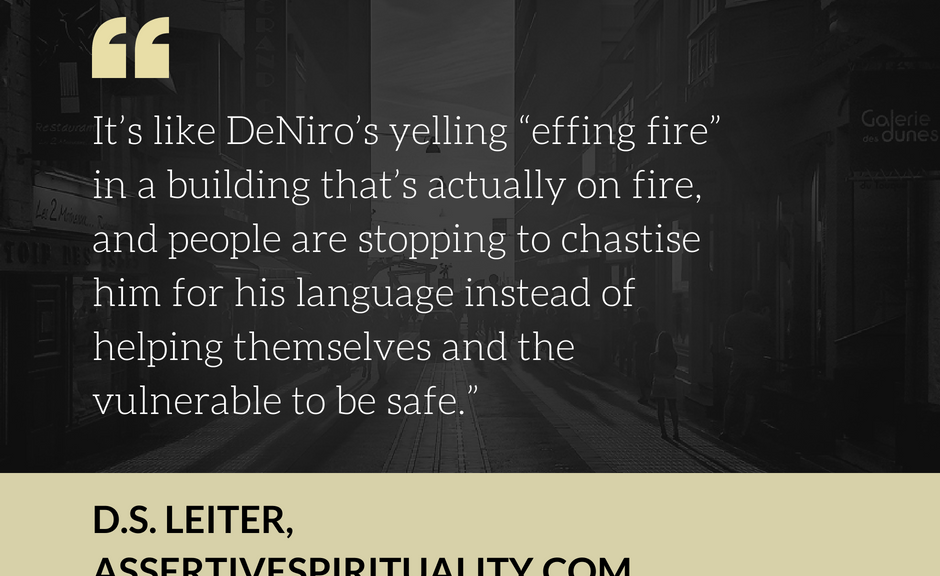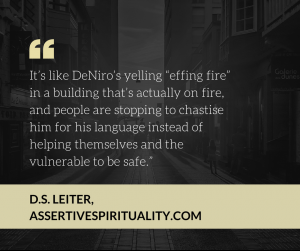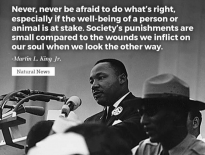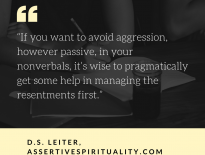
Swear-policing part 2/”Christian Nice” part 3: The Robert DeNiro Vulgarity Case
So as I started writing this I was recovering from a Facebook conversation about the Robert DeNiro’s vulgarity. (Literally recovering—as will be discussed in next week’s post, I feel aggression of all kinds can cause literal pain under some circumstances, and as I’ve said, I’ve been there and done that regarding all kinds of conflict situations.) At any rate, I’m very glad I pushed through the twinges to engage in the conversation thoroughly with those of opposing perspectives, if only because I gained new insights to the questions of swear-policing and the toxic crap that goes along with “Christian Nice” that I’ve already been discussing here.
One quick note before I dive in: obviously I have a side here. But while this analysis is political (the root of the word politics being policy, which is about what we should do to solve problems in the world), this analysis is not meant to be partisan.
The Robert DeNiro Vulgarity Incident
Here’s the deal in case you hadn’t heard about it. At the Tony Awards the other night, Robert DeNiro said “F*** Trump” and flexed his muscles in a show of competitive call to arms. The audience in the room cheered wildly.
Afterwards, largely on social media, a major swear-policing hullaballoo ensued from the other side of the aisle and especially, I think, from “moderates.” Since I know a lot of people who voted for each candidate in the last US election (the result of having grown up as a pastor’s kid in a moderate denomination with people on both sides of the political aisle), the Almighty Facebook Algorithm occasionally lets one of these posts from my group of anti-conflict “Christian Nice” moderates slip through its usual echo chamber effect, and that’s what happened last week.
Swear-Policing as an Attempt to Maintain A State of Cordial Hypocrisy
The main post by my friend exhibited CLASSIC swear-policing as I’ve described it earlier: my acquaintance said straight out—and maintained throughout all the strong responses in the ensuing dialogue—that those who had issues with the current head of the US administration ought to equally condemn DeNiro’s “vulgarity” JUST AS MUCH as we do those issued from those at the top of the executive branch. Several of his readers strongly agreed—from more or less articulate perspectives. I was among those who disagreed.
I knew I would get strong responses, but I saw fellow souls also opposing the swear-policing being attacked, so I girded my Assertive Spirituality-armored loins™ and dove in to learn more about why vulgarity evoked such a strong disgust reaction from them.
What they said—and how they said it—was so telling.
They were concerned about maintaining a “civil society” (one guy actually used those words). Specifically, they seemed to be disturbed by the way our society at all levels had moved away, in their view, from a frame of calm, rational “civil” debate. They seemed to want that to return.
In Which I Have Empathy, But Also Assertively Disagree
This insight didn’t shock me because I’ve heard (and felt) this fear of conflict before. But it did make me sad, because it was framing all competitive responses to conflict as both equal and terrible. This was extremely ironic, because in order to try to get others to toe the line of cordial hypocrisy, there were a lot of competitive instincts being enacted in the exchange.
As a scholar of stress responses to felt threat, I didn’t expect them to perfectly hold to their own anti-competition creed. Where we differed was that they were seeing the use of swear words—by anyone and everyone—as the marker of the slippery slope to losing our hold on civilization. For them, the F word was like the edge of one of those old-timey maps that just said “there be monsters beyond this point.”
No one was trustworthy for them if they used swears (a perspective that defined the “heathen” in disturbingly easy and cut-and-dried terms, if you ask my current anti-swear-policing self). Their disgust was completely blocking their listening to those from other perspectives, sadly enough—and ironically, from communicating civil caring for those who saw things differently by expressing legitimately different fears for the well-being of the US and its inhabitants.
Listening Enough to Find Out the Roots of Division
It ultimately hit me that what was dividing the sides was the differing applications of the term “civil society.”
Not to get too deep into various definitions of civility, but the one I use most, from the same reading by Gill and Sypher where I got the term cordial hypocrisy, boils down to the following:
Civility is about seeking, as much as possible, in a constantly shifting way, about taking care of three things:
- your needs,
- the needs of others, and
- the needs of the situation at hand.
Both saw dangers in the way society was going. The differences lay partly in both sides feeling that the opposing side wasn’t taking care of the needs of themselves or others. But the real tension lay in the sides’ definitions of the rhetorical situation.
The Swear-Policers’ Side
One side—the swear-policers—saw the country as descending into chaos because people were going against a set of rules that they’d predetermined. They basically saw all public speaking to be a formal debate, and were looking to enforce their view of the rules; no swearing!
They associated civilization with rationality and politeness, which excluded competitive, seemingly emotional responses; to these folks, DeNiro’s statement was an emphatic problem. As much a problem as the vulgarities as they’ve seen coming from government officials.
Their solution? Stop the swearing. Stick with the rules. Let’s get back to the rational debate, please, and persuade people with more articulate language.
Detecting the Real Causes of Threat
Hey, I can empathize with much about this perspective—I too strongly miss having articulate leaders, and ones that didn’t talk about grabbing women by private parts or refer to whole countries as defecations.
The problem is that things were never entirely rational or humane, in this country or elsewhere, even when they seemed that way. And from growing up in “Christian Nice,” I know it’s not about the words but about how words are used–not to mention how they’re paired with action. And the norms the swear-police are proposing are by no means universal.
Here’s the crux of the matter: what divides “Christian nice” (swear-policing) moderates such as these from those firmly ensconced in the Resistance isn’t really about having visceral reactions to the current political climate. It certainly isn’t having fight/anger responses (boy, were those ever strong in the swear-policing defenders in the thread I was responding to!). On the contrary, it’s in the definition of the situation.
Not a Debate, a House on Fire
The other side—we’ll call them the Resistance, since that’s the term that’s been most usually applied—also sees problems in the US. They believe the country is a house on fire. They believe DeNiro was swearing emphatically in his desire to help fix the problem for everyone. They appreciate the situational need to act more urgently in a house on fire situation than in a debate situation.
Most importantly, they don’t see the opponents as the hordes of unwashed swearers, but as those current leaders who, while they didn’t start the fires (cue that Billy Joel earworm of my youth) of things like racism and sexism and xenophobia, are currently throwing an awful lot of gasoline on the flames. And burning up what they see as the more important civil society “debate rules” of the Constitution in the process.
An Invitation to Fight the Fire and Save People
 See, those on the other side of the debate about swear-policing aren’t saying swears were necessarily a great thing. Instead: It’s like DeNiro’s yelling “there’s an effing fire” in a building that’s actually on fire, and people are stopping to chastise him for this language instead of rushing to get buckets of water to best end the threat while helping the vulnerable to safety.
See, those on the other side of the debate about swear-policing aren’t saying swears were necessarily a great thing. Instead: It’s like DeNiro’s yelling “there’s an effing fire” in a building that’s actually on fire, and people are stopping to chastise him for this language instead of rushing to get buckets of water to best end the threat while helping the vulnerable to safety.
The Resistance simply doesn’t see the swearing as the worst violation in the situation by a long shot.
To the pro-Resistance folk, DeNiro’s speech was not meant to be divisive at all, but a clear invitation to join those who were working to put out the flames and get the people in the building to safety. It was a brief call to arms—perhaps not as long or articulate as those we see in every action movie—but a call to arms nonetheless.
And those in the Resistance have been understandably feeling unheard and disrespected—feeling like the swear-policers are being uncivil. That’s because they feel those who are worried about the swears are doing the equivalent of sitting in the way obstructing the exits for the rest of those vulnerable to the flames rather than helping.
They see major problems in this country, and they want to fix them so badly. They are using the stress of the situation to jump to it, and are spelling each other and taking care of themselves and others when they need breaks. And they see the swear-policers as obstructive distractors from that task.
Want to Hear More about My Rhetorical Toolbox? Sign up for the Email List!
Again, I have more to say on the specifics of this encounter and my rhetorical tricks and tips I used in this conversation in my “Assertive Spirituality Guide to Online Trolls,” which this incident has inspired me to finish. For a limited time, anyone who signs up for the email newsletter will receive a copy, so sign up now to get a copy, and tell your friends!
_______
Like this post? Comment, share it (bar on the bottom), sign up for our email list (in the pull down bar above) and/or stick around and check out our other content!


8 thoughts on “Swear-policing part 2/”Christian Nice” part 3: The Robert DeNiro Vulgarity Case”
I like your stuff. Look forward to reading more posts.
Thanks Candice! If you haven’t already, sign up for the email newsletter in case you forget to check back!
Really useful reading on how to deal with this whole mess.
I’m so glad to hear it! Check out the other articles as well–I know I’ve found it cathartic to write them, and helpful to have the communication expertise to help me write them. (And if you want help with dealing with difficult conversations, sign up for the email newsletter to get the free “Guide to Trolls” PDF!) Go team #AssertiveSpirituality!